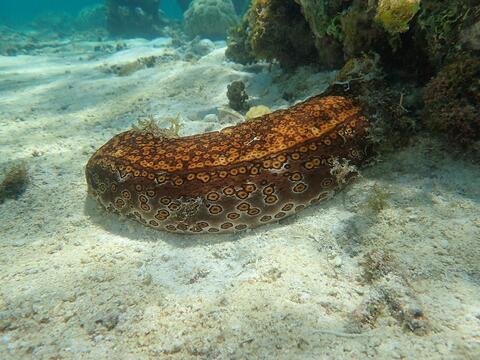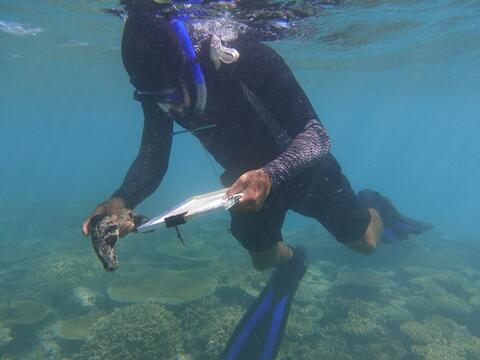Developing innovative ways to provide stock assessments for our members to manage their sea cucumber fisheries and protect these valuable resources for the future
Sea cucumbers are marine animals that are found on the sea floor. They play a key role in maintaining ecosystem services by removing organic matter and keeping sediments and sand healthy. Sea cucumbers are also a high value seafood commodity which are mostly exported to Asia as processed beche-de-mer, bringing in much needed revenue directly to communities across the Pacific.

Over the last 40 years, trade has increased exponentially due to growing demand from Asia, which has driven a large increase in price across all aspects of the value and market chain. When coupled with high intensity artisanal fishing, the combination of biological characteristics including slow growth, late age-at-maturity, susceptibility to density dependent reproductive success, the ease of illegal harvesting and sales, have made sea cucumbers especially vulnerable to over-exploitation.
Management
Managing these valuable stocks is of high importance to protect the ecosystem, as well as the stability of the income they provide. A well-managed sea cucumber fishery will avoid the boom-bust cycle that is typical of the sea cucumber industry, regionally and globally. Effective management will also provide consistency in revenue streams for communities allowing investment in product development and value-adding across the market chain. Stock assessments allow catch targets to be set by fisheries managers in order to allow sustainable fishing, reducing the risk of population decline.
Challenges for stock assessments
Carrying out a stock assessment of sea cucumbers in the Pacific region poses challenges. There is limited capacity for undertaking scientific sea cucumber population assessments, fisheries compliance, monitoring, evaluation, and reporting. This paradigm has impeded the development and implementation of effective management strategies to deal with the growth in demand for sea cucumbers, with many countries using moratoria over the last 10-20 years as the only means of response to declining sea cucumber stocks. Sea cucumber fishing is predominately artisanal and small-scale, and is inclusive of men, women, children and the elderly. The introduction of fishing bans has led to an immediate loss of income for many coastal and island communities across the Pacific Islands region, as well as loss of revenue for governments and management agencies, which further impedes capacity to deal with issues across the sea cucumber market chain.

Sea cucumber stock assessments require an increase in strategic investment in developing monitoring programs that can target key areas of the sea cucumber market chain, such as key exporters and beche-de-mer processing facilities. Data collection tools need to be developed that can increase the efficiency of monitoring programs so that fisheries managers can be more reactive to changing stock status whilst also improving our understanding of how sea cucumber populations respond to fishing pressure.
Support and training
Our coastal fisheries science team engages in a diverse range of capacity building and training programmes with national scientific authorities across PICTs. On request from member countries, we work with local scientific and management authorities to help them increase their scientific understanding of coastal invertebrate resources and to improve and develop coastal fisheries management plans.
Working with the FAME database teams, we also provide regional data management systems for coastal fisheries across the Pacific. In addition to other e-data tools for data management and stock assessment a web-based data management tool - “Field Surveys” - has been developed to assist member countries with stock assessment of key fisheries invertebrates including sea cucumbers. This e-data tool is built on the legacy RFID database developed during the PROCFISH program and increases efficiencies via online web-based data management. The suite of e-tools currently provides functions to export summary statistics and plotting to streamline data analysis.
